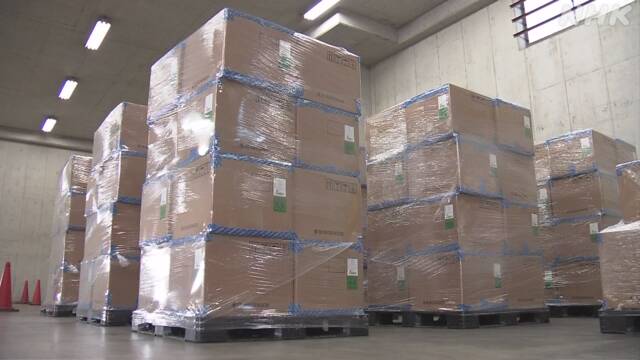Since the shortage of labor at hospitals due to the inability of medical staff who have become close contacts to go to work has become an issue, Yokohama City has independently secured an antigen test kit to help shorten the waiting period at home. It is distributed to medical institutions.
According to the city of Yokohama, there were 432 cases of "difficult-to-transport" cases in which the recipients of emergency patients, including corona patients, were not immediately decided in the week up to the 20th of this month, the highest number ever. It means that.
At the Yokohama City Coordination Headquarters "Y-CERT", which coordinates the hospitalization of corona patients, medical staff became infected or became close contacts due to the influence of the highly infectious Omicron strain, and they could not go to work. It is analyzed that the number of cases that are not accepted even if there is a bed is increasing.
Since the end of last month, it is estimated that the number of doctors and nurses who cannot commute to work continues to exceed 2000 every day in Kanagawa Prefecture.
In response to this situation, Yokohama City has independently secured about 700,000 antigen test kits and has begun distributing them to medical institutions and nursery centers.
Essential workers such as medical personnel can return to work on the 5th day at the earliest if a negative antigen test kit is confirmed even if they become close contacts, so it is recommended to use the test kit to support their return to work. The aim is.
"Y-CERT" cooperating doctor and chief professor Ichiro Takeuchi of Yokohama City University said, "Especially since the beginning of this month, the number of people who are hospitalized mainly for the elderly is increasing, but I feel that the hospital's acceptance capacity is declining. In winter, there are many regular emergency transports other than corona, so it is necessary to make sure that people who can be helped are prepared to help. "
In addition, Yokohama City says, "As a city, we want to firmly support essential workers and maintain their social functions."
At the hospital where the test kit arrived
Last weekend, 750 antigen test kits arrived at "Shonan Izumi Hospital" in Izumi-ku, Yokohama, where there is a fever outpatient clinic and a new corona bed.
Even in this hospital, about 10 people may take a day off due to the fact that doctors and nurses become close contacts, and if there are any symptoms, they are calling on staff to test with an antigen test kit. It means that the stock of the test kit was reduced to about 40 times remaining.
Hideaki Ikeshima, the president of the medical corporation that operates the hospital, said, "I am grateful that the kit was completely insufficient. I would like to give priority to patients who need urgent diagnosis and then make it available to staff. I managed to deal with it, but it would be very difficult if there were no more staff. "
Some hospitals keep medical staff waiting at home for 10 days
On the other hand, some hospitals set the home waiting period for healthcare professionals to 10 days.
From last month to the middle of this month, a total of 48 people, including staff and patients, were infected one after another at "Showa University Northern Yokohama Hospital" in Tsuzuki-ku, Yokohama.
In addition to the infected staff, the number of staff who could not go to work due to close contact or the childcare center was closed temporarily exceeded 100.
Especially for nurses, more than 10% of the total was closed, so about 40% of the beds were closed.
At this hospital, the period of waiting at home for close contacts is set to 10 days, and even now, about 50 people, including infected and close contacts, are not able to go to work.
It is also necessary to gradually increase the number of beds for the new corona, which means that only about 80% of general beds can be operated.
We are planning to receive test kits at this hospital as well, but we plan to maintain the 10-day home waiting period in the future due to the lessons learned from the infected people.
Mitsutaka Kadokura, director of the hospital, said, "I think there is an idea that if you take sufficient infection control measures, you can shorten the waiting period at home to maintain medical care. However, you will come into contact with patients with weakened immune system. This is dangerous, so I want to continue the current method even if I overdo it a little. "

